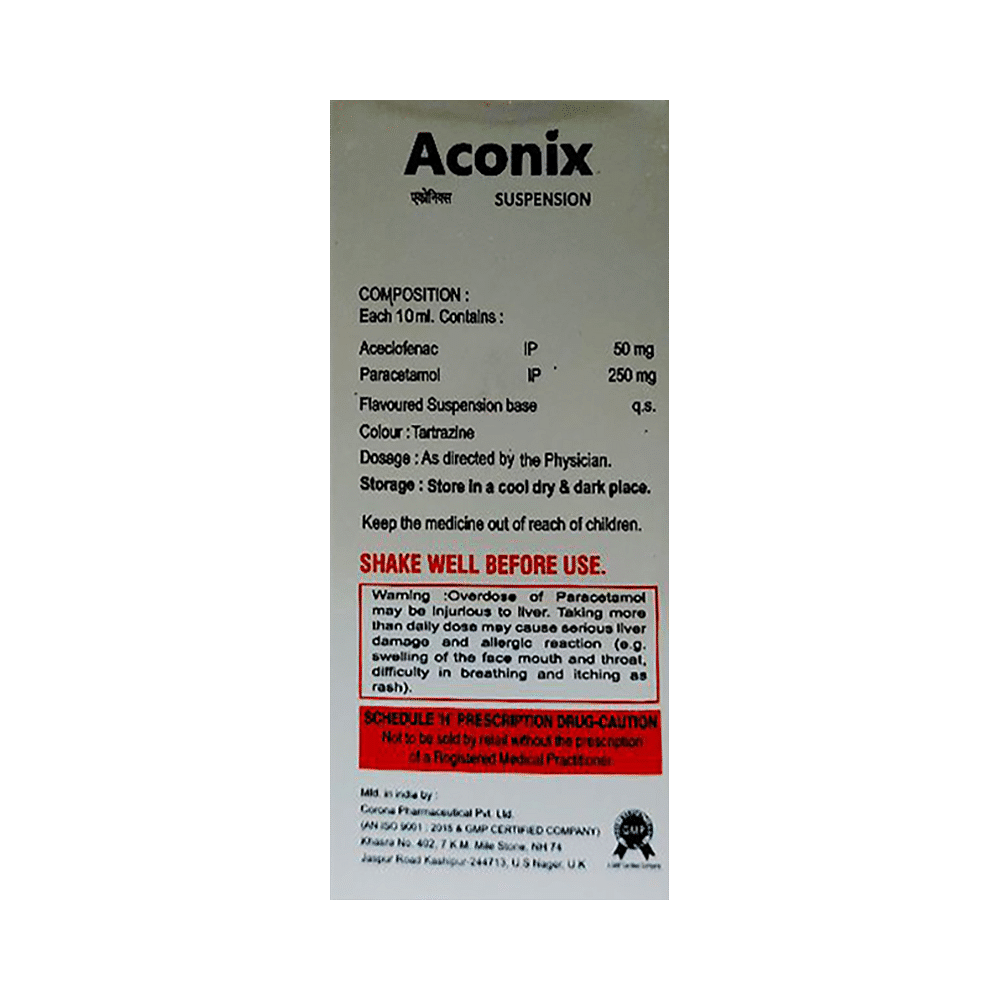


Aconix Oral Suspension
Manufacturer
Medinix Pharmaceutical Pvt Ltd
Salt Composition
Aceclofenac (50mg/10ml) + Paracetamol (2mg/10ml)
Key Information
Short Description
Aconix Oral Suspension is a pain-relieving medicine used to reduce pain and inflammation in conditions like rheumatoid arthritis, ankylosing spondylitis, and osteoarthritis.
Dosage Form
Oral Suspension
Introduction
Aconix Oral Suspension is a combination of two medicines: Aceclofenac and Paracetamol. It should be taken with or without food. You should take it regularly as advised by your doctor. Your doctor may change the dose and time between doses according to your pain level and your needs. Do not take more or use it for a longer duration than recommended by your doctor.
Directions for Use
Take this medicine in the dose and duration as advised by your doctor. Check the label for directions before use. Measure it with a measuring cup and take it by mouth. Shake well before use. Aconix Oral Suspension may be taken with or without food but it is better to take it at a fixed time.
Safety Information
Side Effects
No common side effects listed.
Alcohol Warning
It is unsafe to consume alcohol with Aconix Oral Suspension.
Breastfeeding Warning
Information regarding the use of Aconix Oral Suspension during breastfeeding is not available. Please consult your doctor.
Pregnancy Warning
Aconix Oral Suspension may be unsafe to use during pregnancy. Although there are limited studies in humans, animal studies have shown harmful effects on the developing baby. Your doctor will weigh the benefits and any potential risks before prescribing it to you. Please consult your doctor.
How it works
Aconix Oral Suspension is a combination of two medicines: Aceclofenac and Paracetamol. These medicines work by blocking the action of chemical messengers responsible for pain, fever, and inflammation (redness and swelling).
Quick Tips
You have been prescribed this combination medicine for relieving pain and inflammation. Take Aconix Oral Suspension with food to avoid getting an upset stomach. Do not take Aconix Oral Suspension with any other medicine containing paracetamol (drugs for pain/fever or cough-and-cold) without asking your doctor first. It may cause dizziness and sleepiness. Do not drive or do anything that requires mental focus until you know how it affects you. Avoid consuming alcohol when taking Aconix Oral Suspension as it may cause excessive drowsiness and increase the risk of liver damage.
Frequently asked questions
What is Aconix Oral Suspension?
Aconix Oral Suspension is a combination of two medicines: Aceclofenac and Paracetamol. This medication helps to relieve pain and inflammation by lowering the levels of chemical substances in the body that cause pain and inflammation.
Is Aconix Oral Suspension safe to use?
Aconix Oral Suspension is generally safe for most patients. However, some people may experience unwanted side effects such as nausea, vomiting, stomach pain, heartburn, diarrhea, and others. It's important to speak with your doctor if you have any concerns about potential side effects.
When can I stop taking Aconix Oral Suspension?
If you are using the medication for a condition associated with long-term pain, your doctor will advise on how long to take it. If you're using it for short-term pain relief, discontinue use as directed by your physician.
Can Aconix Oral Suspension cause nausea and vomiting?
Yes, Aconix Oral Suspension can cause nausea and vomiting. Taking it with milk, food, or antacids may help prevent nausea. Avoid taking fatty or fried foods alongside this medication. If you experience vomiting, drink plenty of fluids by taking small frequent sips. Consult your doctor if vomiting persists and notice signs of dehydration like dark urine or infrequent urination. Do not take any other medicine without consulting your doctor.
Can Aconix Oral Suspension cause dizziness?
Yes, Aconix Oral Suspension can cause dizziness (feeling faint, weak, unsteady, or lightheaded) in some patients. If you feel dizzy or lightheaded, rest and resume taking the medication when feeling better.
Are there any specific contraindications for using Aconix Oral Suspension?
Aconix Oral Suspension should be avoided in patients with known allergies to any component of this medicine or other pain relievers (NSAIDs). It should also be avoided in individuals with a history of stomach ulcers or active, recurrent stomach ulcers. The medication is not recommended for people with kidney or liver disease.
Can Aconix Oral Suspension be taken with vitamin B-complex?
Yes, Aconix Oral Suspension can be taken together with vitamin B-complex preparations. While Aconix Oral Suspension helps relieve pain, vitamin B-complex may aid in correcting any potential vitamin deficiencies that might contribute to the underlying painful condition.
Can Aconix Oral Suspension be used for stomach pain relief?
No, Aconix Oral Suspension is not suitable for treating stomach pain without first consulting your physician. It can increase stomach acid secretion which might worsen an unknown underlying condition.
Does Aconix Oral Suspension have a risk of kidney damage?
Yes, long-term use of Aconix Oral Suspension may cause kidney damage. The medication lowers prostaglandin levels in the body, which protects the kidneys from damage. If you have pre-existing kidney disease, avoid using Aconix Oral Suspension.
Can I increase my dosage of Aconix Oral Suspension?
No, it is not advisable to take a higher dose of Aconix Oral Suspension than the recommended amount. Using more medication can lead to unwanted side effects or complications.
How long does it take for Aconix Oral Suspension to show results?
The effect of Aconix Oral Suspension is often seen within 1.5 to 3 hours after oral administration of the medication, but individual experiences may vary.
What is the dosage of Aconix Oral Suspension?
Take one tablet of Aconix Oral Suspension twice daily as directed by your doctor. Always follow their instructions for usage and dosage.
Can I take Aconix Oral Suspension with other painkiller tablets?
No, it's not recommended to combine Aconix Oral Suspension with other pain relievers without consulting your doctor as this may lead to unwanted side effects.
Is Aconix Oral Suspension safe for children?
No, Aconix Oral Suspension is not recommended for use in children under the age of 18.


